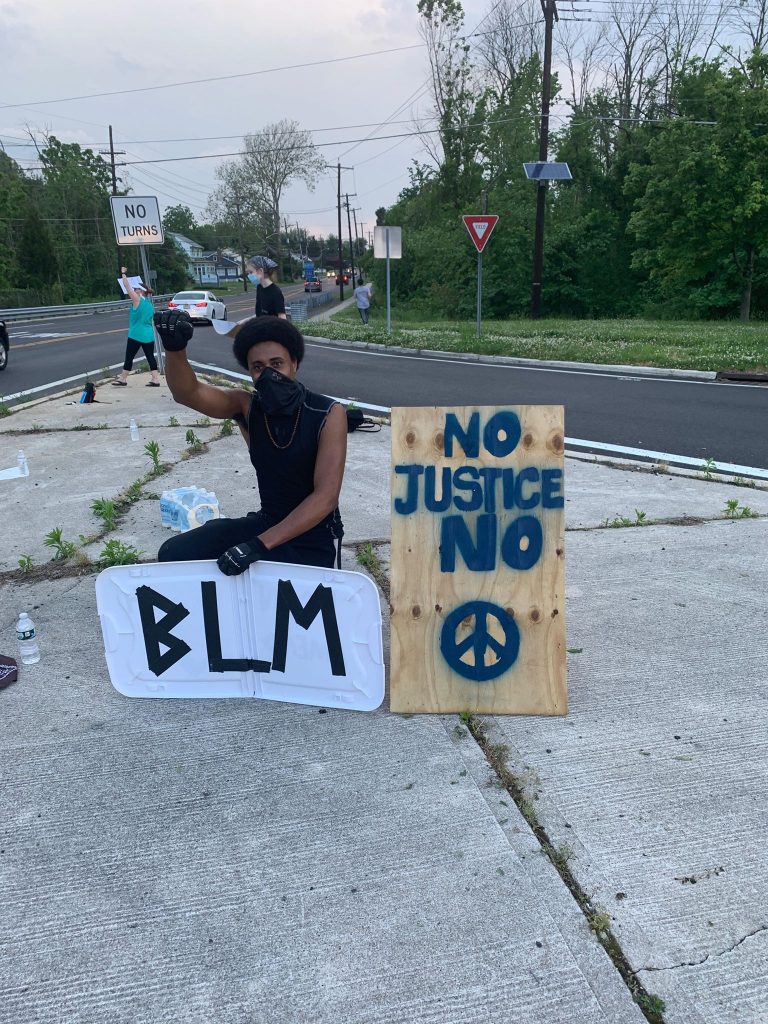

The killing of George Floyd by a former Minneapolis Police officer led Boaz Matlack to stage a lone Black Lives Matter protest on Route 70 in Medford.
Shortly after, he was joined by others and began organizing protests in area suburbs.
The Medford resident, a Black man adopted by a white family, took note of the organized protests in Medford, Medford Lakes, Waterford and Palmyra for “people like him” living in predominantly white suburbs.
“It can be kind of lonely, and it helps that people are around you and have a similar mindset,” he said. “It’s a very conservative area where I live in Medford and growing up here, I wish I knew of more people who were like-minded and more people who were willing to say ‘Black Lives Matter’ and were willing to call out the systemic injustice in America.”
The 21-year-old activist admits he has been privileged to not experience the systemic racism seen around the country to “suppress low-income families and hawk on them because they are a threat.” It has inspired him to give back and “make America better” by holding demonstrations.
Matlack acknowledged dealing with racism in higher education, at work and in high school. Some of it included being called the N-word.
“People who know me know that it’s not okay to say those words around me,” he noted. “I kind of let people know not to use those words. When it does come up, it does give me the pit in my stomach feeling of anxiety and it makes me feel … disassociated.”
During an extended stay in Hudson, Florida, Matlack said a police officer “managed to find a reason” to pull him over 10 times in a week. Police have a presence outside of ensuring safety, so Matlack wanted chiefs included in discussions and protests about racism and how local departments can help mend racial tensions and be leaders.
Some protests saw counter-protesters and “agitators,” both online and in person. Matlack’s approach to that often frightful situation has been calm and conversational.
“Patience is a virtue I hold dearly, and I have patience for racists, ignorance and bigotry,” he shared. “Because I know it comes from a place of just not knowing. Like any teacher, the best way to teach is with patience and empathy.”
So, Matlack has led conversations with people to explain the message of Black Lives Matter and why protests occurred, touching on the disenfranchisement Black people and other minorities experience in America.
A counselor at Camp Dark Waters in Medford, Matlack admitted he has not held discussions with campers about racism, but he recognizes an effort should be made to do that.
“It is a small camp and it’s a personal community,” he noted. “It’s a really nice way to flush out the world and experience camp. That’s where I have the most interaction with kids, but I am working on becoming a teacher and when it comes to racism, that is one of the ways I want to have the effect: addressing bigotry from early stages in a child’s development.”
Matlack, who works two jobs, has focused on the case of 20-year-old Amani Kildea, who was found hanging on a tree in Morristown on June 27. Local police ruled his death a suicide, according to local news reports, but the Morristown Black Lives Matter chapter called the death suspicious and organized protests and vigils to open a formal investigation.
Kildea was a member of the U.S. Army Reserves.
“Absurdly quick and it took a lot of pressure and a lot of voices for local authorities to open the investigation again,” Matlack stated. “Now, I’m working on not letting that county (Morris) take over the investigation — it should be taken to the state or federal level, and the Army CID (Criminal Investigation Division Command). That’s a thing I’m looking at and it has an impact on me because I relate to Kildea.”
But with other issues on social media and in the news, Matlack admitted he expected his protest attendance numbers to fall. He has remained adamant about keeping Black Lives Matter current to address other societal issues stemming from racism.
“We’re going to wake up every nook and cranny of South Jersey because people need to know that this isn’t just a Black issue, it’s a human rights issue,” Matlack insisted.
“I’m going to keep doing this.”









